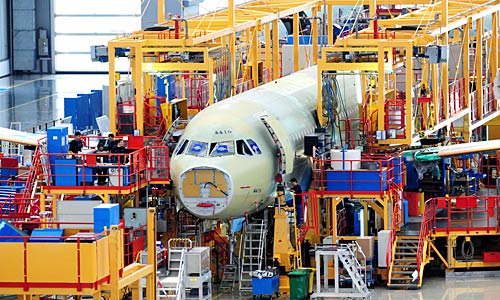|
 |
|
AIRCRAFT BUILDER: A worker works on an A320 airliner at the final assembly line in Tianjin Municipality. The Tianjin assembly line is the only aircraft final assembly line Airbus has outside Europe and has so far delivered 29 A320 planes (LIU HAIFENG) |
Innovative Companies
Innovation in Chinese enterprises is steadily increasing with more patents filed and more funds invested in research and development (R&D), the China Enterprise Confederation (CEC) said on September 4.
The top 500 Chinese enterprises possessed 169,000 patents in 2010, up 13.3 percent from last year, according to a report released by the CEC.
Among the top 500 companies, 41 had more than 1,000 patents, while 36 companies owned more than 200 patents for innovations, the report said.
Chinese enterprises were also investing a larger share of their revenues into R&D.
Each of the top 500 firms allocated, on average, 775 million yuan ($113.9 million) into R&D, an increase of 14.4 percent from 2009 and accounting for 1.4 percent of their total revenues, the CEC said.
Superbug Alert
China's Ministry of Health announced on September 8 that it has ordered medical institutions to be on alert against the multi-drug resistant bacteria NDM-1. No cases have yet been reported in China.
The ministry has ordered all medical institutions across China to strictly follow basic principles regarding clinical use of antibiotic drugs, and administer such drugs in a prudent manner.
The ministry has stepped up supervision of medical institutions on their drug use and planned to set up a national center to monitor clinical drug use in hospitals and clinics.
The ministry also ordered medical institutions to closely monitor patients who have weak immunity and patients in critical condition for early detection of the bacteria.
Once a case is detected, it must be reported to the ministry's surveillance network on drug-resistant bacteria within 12 hours.
Strengthened Monitoring
China's food monitoring and risk assessment systems are to be upgraded with new technologies and more funding, said a government report on September 3.
According to Xinhua News Agency, the report was submitted to China's top legislature by a food safety office under the State Council, or the cabinet, which gave an account of the government's work in implementing the Food Safety Law.
To improve assessment of safety risks of food and agricultural products, the government has already drawn up regulations and set up national expert commissions, it said.
The government will work to build a more extensive safety risk assessment system, make assessment more standardized, and broaden its information monitoring, it said.
The report said the Ministry of Health had established 31 food safety monitoring centers at provincial levels and 312 at county levels, while the Ministry of Agriculture had expanded monitoring of quality and safety of agricultural products to 259 big and medium cities.
Animal Welfare
South China's Guangdong Province will enact a local law on October 1 to regulate the use of laboratory animals and protect animal welfare, government authorities said on September 8.
According to the Laboratory Animals Management Regulation of Guangdong Province, all lab animals should be anaesthetized before experimental surgeries and animals must be euthanized after experiments, said Zhou Haitao, an official with Guangdong provincial department of science and technology.
It also stipulates that people engaged in laboratory work should monitor the conditions of lab animals, care for them, and not abuse them during the production, use and transportation process.
Further, if scientific research is not conducted as required by the law, the results of the experiments, evaluations and other findings would be deemed invalid, according to the regulation. | 